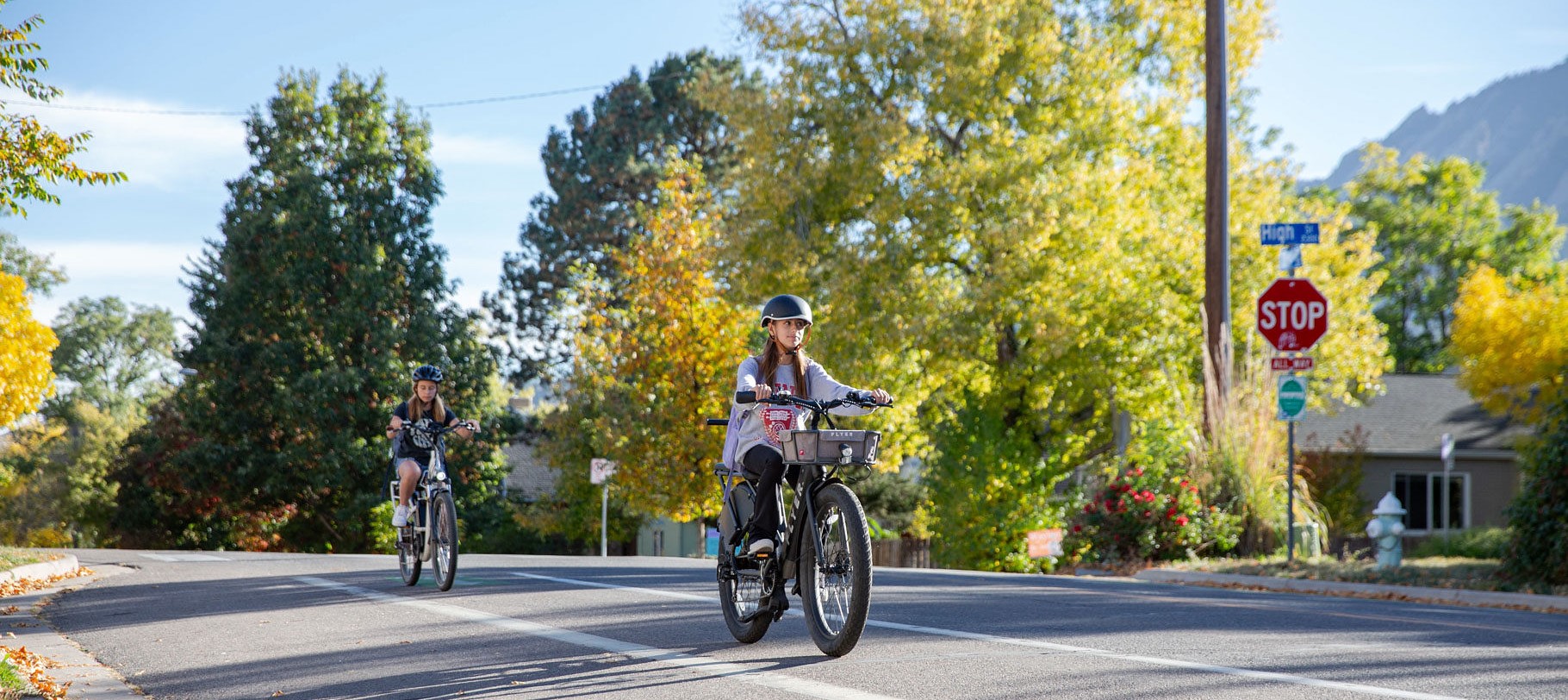What are e-Bikes?
Electric bicycles, or e-Bikes, provide riders with a speed boost through an electric motor, making it possible to bike greater distances and up steeper inclines and more easily get to your destinations. They are also more accessible to people of different ages and abilities than manual bikes. E-Cargo Bikes are a great option to carry kids to school or bring groceries home. Read more about why e-Bikes might be a good fit for you and your family from the State of Colorado, here.
Types of e-Bikes
e-Bikes are classified based on their maximum speed and how they give you power:
- Class 1: 20 mph maximum speed, power from electric motor provided to the rider when pedaling.
- Class 2: 20 mph maximum speed, power from electric motor provided to the rider when pedaling or activated by a throttle.
- Class 3: 28 mph maximum speed, power from electric motor provided to the rider when pedaling; motor capacity is capped at 750 watts.
Several sub-types of e-Bikes can help people with mobility-limiting disabilities, or who are carrying additional materials or passengers:
- Adaptive e-Bike: designed for people with disabilities; typically have 3 or 4 wheels and are set lower to the ground with a basket style seat.
- e-Cargo Bike: have extended frames, are designed to carry passengers or extra weight/cargo, and have attachment points for additional racks, baskets, or seats.
For general information, safety tips, and an e-Bike buyer’s guide, please visit the Community Cycles website. Community Cycles is a Boulder-based nonprofit organization that expands bicycle ridership through access, education, and advocacy.
Boulder County’s Community Planning and Permitting Office offers safety tips and more here.
e-Bikes on Trails
In Boulder County, class 1 and 2 e-Bikes are allowed on designated regional and Open Space trails in the plains. All e-Bikes are prohibited on foothills and mountain trails. Visit Boulder County’s Open Space map for more details on where you can take your e-Bike, including details on e-Bike permissions for people with mobility disabilities.
As you consider the purchase of an e-Bike, please consider that class 3 e-Bikes are only allowed on roads and in bike lanes and must be operated only by people age 16 or older. For more information, please visit the Colorado State Assembly’s page on statewide e-Bike laws.
Discounts and Incentives
As of April 1, 2024, all Colorado residents can receive a $450 discount towards the purchase of an e-Bike through the Colorado Energy Office (CEO). E-bike purchasers who buy a qualified e-Bike at a participating retailer will automatically receive the discount, with a limit of one purchase per calendar year.
Replacing car trips with an e-Bike is a fun and cost-effective way to commute to work and run errands, and also get exercise, save money, and reduce pollution!
To receive this discount you must:
- Provide proof of a physical Colorado address at the time of purchase. If you are unhoused in Colorado, a dated letter from a government agency or non-profit organization you are receiving services from may be accepted in place of proof of address.
- Purchase your e-Bike at a participating e-Bike retailer. Participating retailers will verify your proof of address and apply the discount at the time of your e-Bike purchase.
- Pay full sales tax on the e-bike, even if the discount exceeds the e-Bike’s price.
Not all e-Bikes will be eligible for this discount. Please confirm the e-Bike you are looking to purchase is eligible for the discount with your retailer. For more information on this program, including e-Bike model eligibility and a list of acceptable proof of address documents, visit the CEO website.


